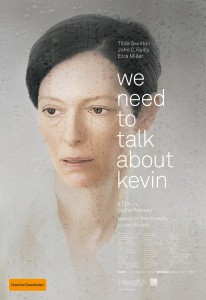Or perhaps not. Meryl Streep won for an impression of a pivotal and controversial character in British political history, in an interesting but not always satisfying biopic. Swinton plays Eva, a woman teetering on the edge, wracked by guilt and universally reviled following the actions of her son. Which of these is the more palatable?
Of course, Swinton barely needs to act to look close to the edge. Her incredible, almost alien features, with bulging eyes, pale skin, and harsh sliver of a mouth, convey a huge amount of horror and self loathing. Add in some severe hair styles and make up that paint her features in as wan a light as possible, and its hard not to be washed up into her nightmare world.
Before I continue: MASSIVE SPOILER ALERT FROM HERE ON IN
What happens in the film is really not that much of a surprise. From the start, Kevin is a pain. A complete nightmare of a child. He could have been called Damien and you could quite easily believe that this was a remake of The Omen. The film enjoys showing Kevin, played by several different actors (all of them annoying, in a good way), appear to be a complete brat.
The film is less successful in tying the origin of those traits to Eva. Eva is shown as not really being maternal (and considering the trials she had with Kevin, that is perhaps not so surprising), but it is only really at a game of mini golf where Eva's attitudes and how they might have influenced Kevin are shown.
The film jumps around chronologically, so it telegraphs what is coming at the end pretty early on. Personally, I found the final "What Kevin Does" scene a bit of a let down. I am not sure what happens in the book, but in the film, it plays out like a rather tragic made for television movie, the "bad guy" walking in slow motion to the arms of the law and then, later, there is wailing and screaming as disorder is let loose again. And the actual mechanics of how Kevin commits his heinous act is a bit dumb, as, while I am sure he is proficient with a bow and arrow, it would be much easier and (in a way) less intimidating to rush a man holding such a weapon than it would be with a person with a gun. And how did he lock all the doors and then get to an optimal (and unassailable) firing position with a large bow and a quiver of arrows without anyone noticing something? I am not sure if this film was sponsored by the American National Rifle Association to show non-firearms as potential terror tools, but the situation felt a bit too forced to me, a bit too unbelievable.
The thing about We Need to Talk About Kevin is that, well, noone actually does talk about Kevin. Or talk with Kevin. His father, his friends (assuming he has some), his teachers (assuming he has some) and of course his mother all seem determined not to talk about him. Given the complete societal failure to address Kevin's issues and the fact Kevin was a real prick, I found it very hard to "blame" Eva, though I suppose that would not stop a mother from being singled out. I also found her ostracising a little extreme as well, as even serial killers have their admirers, but then I really cannot talk from experience about the kinds of feelings these sorts of events would generate.
So overall, this is a harrowing and rather good film, marred for me only by a failure of nerve in the end to eschew the Hollywood way of doing things and giving in to a bit of melodrama. None of that criticism can be laid at the feet of Swinton, who delivers an incredibly powerful and moving performance, and as she is basically in every scene, she completely carries the film.
Verdict: We Need To Talk About Kevin is a gripping, difficult film to watch. Swinton is amazing, and the supporting actors do a good if ultimately eclipsed job with what little is left in Swinton's shadow. The story itself is challenging, even if it does at times seem to stick to some fictional conventions. It is definitely not a film for everyone, but it is a good watch for those who can stomach seeing it. 7 arrows out of 10.



No comments:
Post a Comment